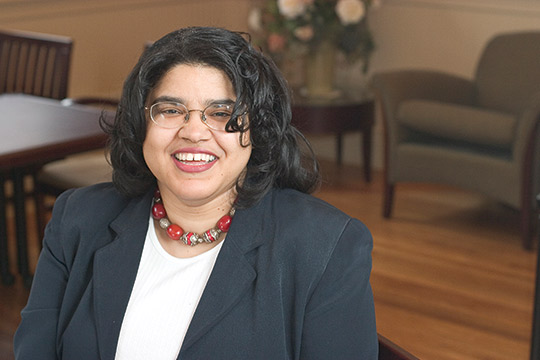Using African Literacies to Foster English Ones: Michelle Knight studies a group that assists U.S. schools to support immigrant girls
How can U.S. high schools best help newly arrived immigrant students from Africa learn academic literacies so they can succeed and go to college?
That question underlies a new study by Michelle Knight, Associate Professor of Education, of work by a community organization called Sauti Yetu, which is helping teenage girls from Nigeria, Senegal, Mali, Gambia, Mauritania, Sierre Leone, Tanzania and Liberia achieve “academic literacies” at several of New York City’s International High Schools
The study, titled “Collaborative Culturally Grounded Inquiry: Examining Literacy Practices with/for African Immigrant Girls,” focuses on 10 students, four Sauti Yetu staff members, and 12 mentors. While high school graduation rates for many minority student populations have been increasing in recent years, graduation rates for English language learners (ELLs) have dipped.
One reason for that disturbing trend is a 141 percent increase in African immigration in major U.S. cities over the past 20 years, which has brought a growing number of students who speak languages such as Fulani, Igbo, Wolof and Amharic, which are not supported by bilingual programs in American schools. Immigrant-led community organizations have sprung up to help, but even schools that work with these groups often understand little about their work, how to best support them and how to capitalize on their efforts. More importantly, schools lack insight about the cultures of African students themselves.
"Many young girls from African countries are already married in high school," says Knight. “People think that means they’re not interested in education. At the same time, textbooks tend to portray Africa in general in a primitive light, when in fact it has a richly literate history that has found expression through Kanga cloths and other materials as much as it has in books.”
Knight’s study, which she designed with Sauti Yetu program director Ramatu Bangura and conducted with two TC doctoral students, Crystal Chen and Karishma Desai, focuses on the Sauti Yetu’s Girls Empowerment and Leadership Initiative, which has served more than 150 girls during the past two years.
The study finds that the program’s use of culturally relevant texts, such as So Long a Letter, a novel by the Senegalese writer Mariama Ba about the condition of women in West African societies, has been a powerful tool to engage girls in comprehending and analyzing text.
Through a coaching/mentorship program, girls are also paired up with women who work in business or at the United Nations or at NGOs, who help them with skills essential to finding jobs and applying to college. They are also encouraged to pursue work outside of school during the school year to learn key social skills and develop “workplace literacy.”
Saudi Yetu also leads students through a four-week critical social action project, in which they discuss educational and social issues they have studied during the year: early marriage, female circumcision, girls’ education, “good hijab/bad hijab” and feminism. In a leadership groups and literacy classes, the students discuss the relevance of these issues to their own lives, then debate each issue from pro and con perspectives and conclude by recording a public service announcement-style “commercial on the issue, complete with a slogan that captures the essence of the pro or con point of view.
While overwhelmingly positive about the impact of most of Sauti Yetu’s work, the study also targets areas for improvement. For example, schools need to integrate culturally relevant texts on a much broader scale. They also should survey students to discover their intellectual strengths and identify their areas of need in different subject areas.
“For many of the girls we studied, English is a fourth or fifth language,” says Knight, who was recently appointed to the board of the New York City Partnership, a collaboration between the New York City Department of Education and the City University of New York aimed at better supporting the linguistic and academic development of English language learners. “That’s an enormous strength, but schools tend to treat it like a deficit.”
Knight and her coauthors also believe that community organizations like Sauti Yetu can further expand “community based spaces” in collaboration with schools for discussion of important issues. And they argue that data is needed on college acceptance and graduation rates among immigrant students, as well on their post-academic plans, in order to confirm the ultimate payoff of all these efforts.
“This is the kind of research I’m interested in – where the community and the university can come together to engage in research that will support the needs they have both identified,” Knight says.
Knight’s study was funded by the American Educational Research Association and will soon be posted on the organization’s website. – Joe Levine
Published Friday, Oct. 10, 2014
